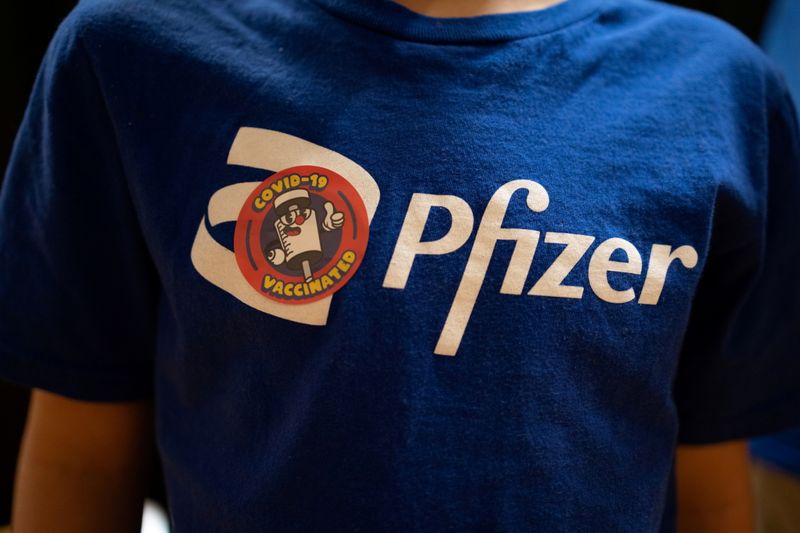By Danilo Masoni and Saikat Chatterjee
LONDON (Reuters) - It is exactly a year since Pfizer (NYSE:PFE)'s announcement of a breakthrough on its experimental COVID-19 vaccine but from emerging markets to airline stocks, many of the trades that were expected to benefit from economies reopening have underwhelmed.
Pfizer-BioNTech's news on Nov. 9, 2020, that their vaccine was more than 90% effective against COVID-19 was seen as a major victory in the fight against a pandemic that had killed more than a million people, pushed the world into recession and roiled markets.
It triggered a frenzy of bets on assets such as emerging markets, "value" stocks and high-yielding debt - which suffered most as economies shut down during the pandemic.
Fast forward a year and COVID-19 is no longer the top concern of investors polled each month by BoFA analysts. But markets have not followed the script.
1/ STOCKS
For "value" sectors such as banks and energy, dogged for years by low valuations and poor growth prospects, COVID-19 was the final straw, sending MSCI's value index to a record low relative to MSCI Growth.
The latter comprises high-flying tech sector names.
Pfizer's vaccine was seen bringing about a value revival, yet several waves of rotation from growth to value in the past year have proved short-lived. The result: the value index is not far off record lows hit in 2020 against MSCI Growth.
The year saw global stocks add nearly $16 trillion in market capitalisation but much was down to tech, possibly as reopenings - and economic recovery - were stymied by COVID. Tech accounts now for 24% of global market cap, from 20% a year back.
Airline shares, considered prime vaccine beneficiaries, have risen less than 20%, versus 42% tech gains
"The exuberance of the Pfizer jab one year ago has been replaced by the after-shock of COVID on supply chains, labour market mismatch and inflation angst," said Kenneth Broux, a strategist at Societe Generale (PA:SOGN) in London.
Underperformance is starkest in emerging equities which have gained a meagre 7% as central banks raised rates to combat inflation and tourism failed to recover.
For a related graphic on Value vs Growth, click https://fingfx.thomsonreuters.com/gfx/mkt/xmpjorreovr/value%20vs%20growth.PNG.
For a related graphic on world stocks, click https://fingfx.thomsonreuters.com/gfx/mkt/akpezmmxyvr/world%20stocks.JPG.
BONDS
Sovereign bonds were among the biggest losers immediately after the vaccine news. But over the following year, safe-haven, low-yielding Swiss and Japanese bonds have led returns while holders of relatively high-yielding debt from Italy and Australia endured losses.
U.S., British and German 10-year government borrowing costs have jumped 40-65 basis points; U.S. yields are on track for their biggest annual rise since 2013.
For a related graphic on Bonds, click https://fingfx.thomsonreuters.com/gfx/mkt/jnpwexxbbpw/bonds.JPG.
CURRENCIES
A 100%-plus oil price rise has sent the Norwegian crown and Canadian dollar up 6% and 4% respectively.
But other reflation bets such as the euro and the Australian dollar have been hit by China's economic slowdown and signs their central banks will move slowly with policy tightening.
With the U.S. dollar index up 4.5%, its best year so far since 2015, emerging market currencies have lagged too.
Currencies such as the tourism-oriented Thai baht have started to gain recently, benefiting from the ditching of zero-COVID curbs, rather than vaccinations.
For a related graphic, click https://fingfx.thomsonreuters.com/gfx/mkt/zgvomkkzyvd/EM%20currencies.JPG
CRYPTO
Bitcoin slipped on Nov. 9, 2020; expectations were that vaccinated retail traders would return to employment and cut back dabbling in crypto. Instead the coin has surged a blistering 340% since then to roughly $68,000.
Rival ether is up almost 1,000%.

The gains are, however, down to abundant liquidity stemming from central bank and government largesse, rather than vaccines.
For arelated graphic on Bitcoin, click https://fingfx.thomsonreuters.com/gfx/mkt/gdpzyddbnvw/bitcoin.JPG.